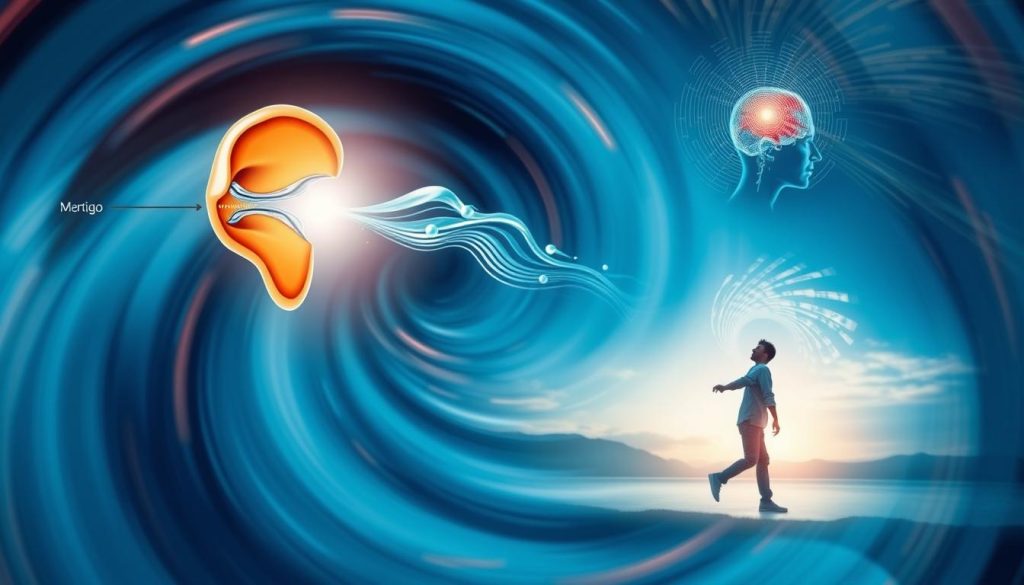Vertigo, a common balance disorder, can make your world spin. This guide explores vertigo symptoms, helping you understand this inner ear issue. We’ll look at how it affects daily life and ways to manage it.
Vertigo symptoms range from mild dizziness to intense spinning. Knowing these signs is key for the right diagnosis and treatment. This guide aims to help you spot vertigo and know what to do next.
If you face occasional or ongoing vertigo, this guide has useful tips. Let’s explore balance disorders and the challenges of vertigo together.
Understanding Vertigo: Definition and Basic Concepts
Vertigo is a balance disorder that makes you feel like you’re spinning. It’s not just feeling dizzy. It’s a specific feeling where you think you or things around you are moving, even when they’re not. Vertigo symptoms can be mild or very severe, making daily life hard.
Types of Vertigo Sensations
People with vertigo often feel different things:
- Spinning or whirling
- Tilting or swaying
- Feeling pulled to one side
- Rocking sensation, like being on a boat
Vertigo vs. Dizziness
Vertigo and dizziness are not the same. Dizziness is a general feeling of being unsteady or lightheaded. Vertigo is a specific feeling of false motion. Knowing the difference is key for the right treatment.
Daily Life Impact
Vertigo can make everyday tasks hard. Simple things like walking, driving, or standing up can be tough. In bad cases, it might cause falls or ear infections. So, it’s important to catch it early and get help fast.
| Activity | Potential Impact |
|---|---|
| Walking | Increased risk of falls |
| Driving | Unsafe operation of vehicles |
| Working | Reduced productivity |
| Sleeping | Disrupted sleep patterns |
Knowing the basics of vertigo helps spot symptoms early. It’s the first step to managing this tough balance disorder.
What Is Vertigo Disease Symptoms
Vertigo symptoms can really disrupt your day. It’s an inner ear issue that makes you feel like you’re spinning, even when you’re not. Knowing the signs is key to getting help.
Common Physical Manifestations
Vertigo shows up in many ways. You might feel like you’re spinning, lose your balance, or feel pulled to one side. Nausea and vomiting often come with these feelings. Some people also sweat or hear ringing in their ears.
Associated Neurological Symptoms
Vertigo can also bring on neurological signs. These include headaches, confusion, or trouble focusing. Some see blurry vision or their eyes move fast. In bad cases, you might even faint or lose consciousness.
Duration and Pattern of Symptoms
How long and how often vertigo hits you can vary. Some attacks are quick, while others last for hours or days. Some people have sudden, intense episodes, while others have milder, ongoing symptoms. Keeping track of these patterns helps doctors figure out what’s causing it.
| Symptom Duration | Possible Cause | Typical Pattern |
|---|---|---|
| Seconds to minutes | BPPV | Triggered by head movements |
| 20 minutes to several hours | Meniere’s disease | Recurring episodes with hearing changes |
| Days to weeks | Vestibular neuritis | Single prolonged episode |
Common Causes of Vertigo Episodes
Vertigo can come from many sources, often tied to balance issues. Knowing what causes it is key to managing and treating it.

Inner ear problems are a big reason for vertigo. The vestibular system, which helps with balance, can go wrong due to infections, injuries, or aging. Benign Paroxysmal Positional Vertigo (BPPV) happens when tiny crystals in the inner ear move, causing brief spins.
Neurological issues can also cause vertigo. Migraines, multiple sclerosis, and brain tumors can mess with balance areas. Vestibular neuritis, an inflammation of the vestibular nerve, can cause severe vertigo that lasts days or weeks.
Other things that can lead to vertigo include:
- Medications with dizziness as a side effect
- Blood pressure changes
- Dehydration or imbalances in electrolytes
- Anxiety or panic disorders
| Cause | Origin | Duration |
|---|---|---|
| BPPV | Inner ear | Seconds to minutes |
| Vestibular neuritis | Nerve inflammation | Days to weeks |
| Meniere’s disease | Inner ear fluid | Hours |
| Migraines | Neurological | Hours to days |
Finding out why you get vertigo is crucial for the right treatment. If vertigo keeps coming back, see a doctor. They can figure out the cause and help you manage it.
Inner Ear Disorders Leading to Vertigo
Vertigo often comes from problems in the inner ear. These issues mess with our balance, causing us to feel like we’re spinning. Let’s look at three common inner ear problems that can lead to vertigo.
BPPV (Benign Paroxysmal Positional Vertigo)
BPPV happens when tiny calcium crystals in the inner ear move out of place. This movement leads to short, intense vertigo episodes when we move our heads. It’s the top reason for vertigo, lasting from seconds to minutes.
Meniere’s Disease
Meniere’s disease is a long-term problem in the inner ear. It causes vertigo attacks that last from 20 minutes to hours. Symptoms also include hearing changes, ringing in the ears, and feeling like the ear is full. The exact reason for Meniere’s is still a mystery, but fluid buildup is thought to play a part.
Labyrinthitis and Vestibular Neuritis
Labyrinthitis and vestibular neuritis are inflammation issues in the inner ear and nerve. Labyrinthitis affects both the hearing and balance parts, while vestibular neuritis only impacts balance. Both can cause sudden, severe vertigo that lasts days to weeks, along with nausea and trouble balancing.
| Inner Ear Disorder | Duration of Vertigo | Key Symptoms |
|---|---|---|
| BPPV | Seconds to minutes | Triggered by head movements |
| Meniere’s Disease | 20 minutes to hours | Hearing loss, tinnitus, ear fullness |
| Labyrinthitis/Vestibular Neuritis | Days to weeks | Sudden onset, nausea, balance issues |
Diagnosing Vertigo: Medical Tests and Procedures
Diagnosing vertigo involves several medical tests and procedures. These help find the cause of balance problems. Doctors use physical exams and special tests to find the issue.
The first step is a detailed medical history and physical exam. Doctors check eye movements, balance, and coordination. This helps them understand the patient’s condition.
Special tests are key in diagnosing vertigo and balance disorders. These include:
- Dix-Hallpike test: Checks for benign paroxysmal positional vertigo (BPPV)
- Electronystagmography (ENG): Looks at eye movements to check inner ear function
- Videonystagmography (VNG): Uses video to measure eye movements
- Rotary chair testing: Tests how the vestibular system responds to movement
In some cases, MRI or CT scans are needed. They help find structural problems or tumors. Blood tests also check for underlying medical conditions that might cause vertigo.
Getting a correct diagnosis is key for treating vertigo and balance disorders. These tests and procedures help doctors create effective treatment plans. They address the specific reasons for a patient’s symptoms.
Treatment Options for Vertigo Patients
Vertigo treatment has many options, each tailored to the patient’s needs. It can greatly improve life for those with vertigo.
Medication-Based Treatments
Doctors often use medicines to help with vertigo. These include antihistamines, anticholinergics, or benzodiazepines. Diuretics are also used to manage fluid buildup in the inner ear, a common cause of vertigo.

Physical Therapy Approaches
Physical therapy is key in managing vertigo. It helps the brain learn to balance again. Exercises include:
- Gaze stabilization techniques
- Balance training
- Canalith repositioning maneuvers for BPPV
Surgical Interventions
In severe cases, surgery might be needed. These surgeries aim to fix ear problems causing vertigo. Examples include:
- Labyrinthectomy
- Vestibular nerve section
- Endolymphatic sac decompression
The right treatment for vertigo depends on the cause and how severe it is. A mix of treatments often works best to manage vertigo.
Natural Remedies and Home Management Strategies
Living with vertigo can be tough, but there are ways to manage it at home. You can try natural remedies and simple strategies. These include making lifestyle changes, eating right, and doing exercises to lessen symptoms.
Lifestyle Modifications
Making small changes in your daily life can help a lot. Try to avoid sudden head movements and get enough sleep. Also, keep your home well-lit and tidy to avoid tripping.
Dietary Considerations
What you eat can affect your vertigo. Cut down on caffeine, alcohol, and salty foods. Drinking lots of water is also important.
Some people find ginger helps with dizziness. Adding ginger to your meals might help you feel better.
Exercise and Balance Training
Doing gentle exercises can improve your balance and reduce vertigo. Here are some easy exercises to try:
- Sit on the edge of your bed and slowly turn your head from side to side
- Stand with your feet together and practice holding your balance
- Walk heel-to-toe in a straight line
Start slowly and stop if you feel dizzy. Doing these exercises regularly can help you balance better and have fewer vertigo episodes. Always talk to your doctor before starting any new exercise.
Prevention Techniques and Risk Factors
Learning how to stop vertigo episodes can greatly improve life for those with balance issues. By using certain strategies, people can lessen how often and how bad vertigo gets.
Keeping your body healthy is key in fighting vertigo. Doing exercises that boost balance and coordination can help your inner ear. Yoga, tai chi, and balance exercises from a physical therapist are great choices.
Changing what you eat can also help with vertigo. Eating less salt can help keep fluid balance in your inner ear, which might cut down on vertigo. Also, drinking less alcohol and caffeine might help some people.
Risk Factors to Consider
- Age: The risk of developing balance disorders increases with age
- Family history: Some types of vertigo have genetic components
- Head injuries: Past trauma can lead to recurring vertigo
- Certain medications: Some drugs may affect the inner ear
Managing stress is also important in preventing vertigo. Stress can make vertigo worse for some. Using relaxation methods like deep breathing, meditation, or muscle relaxation can help.
| Prevention Strategy | Potential Benefits |
|---|---|
| Balance exercises | Improved stability, reduced fall risk |
| Low-salt diet | Better fluid regulation in the inner ear |
| Stress reduction | Fewer vertigo episodes, improved overall well-being |
| Regular sleep schedule | Enhanced vestibular system function |
By tackling these risk factors and using prevention methods, people can manage their balance disorder better. This might even reduce the need for strong vertigo treatments.
When to Seek Emergency Medical Care
Vertigo disease symptoms can be scary, but some need immediate help. Knowing when to act fast is key for your safety.
Red Flag Symptoms
Some vertigo symptoms mean you should go to the emergency room. Look out for sudden, severe headaches or trouble speaking. Vision changes, weakness on one side, or face drooping are also red flags.
If you have vertigo with chest pain or trouble breathing, call 911 right away. Quick action is crucial for severe symptoms.
Emergency Response Guidelines
If you see these warning signs, call 911 or your local emergency number. Try to sit or lie down safely. If you can, have someone stay with you until help gets there.
Knowing when to seek urgent care can prevent serious problems. Always listen to your body. If something feels very wrong, get medical help.
FAQ
Q: What is the difference between vertigo and dizziness?
A: Vertigo is a feeling of spinning when you’re still. Dizziness is a broader term for feeling off-balance or dizzy. Vertigo often comes from ear problems, while dizziness can have many causes.
Q: What are the most common symptoms of vertigo?
A: Common vertigo symptoms include feeling like you’re spinning, losing balance, and nausea. You might also get headaches, have trouble focusing, or feel like your ears are full.
Q: How long do vertigo episodes typically last?
A: Vertigo episodes can last from seconds to hours. Some, like BPPV, are short. Others, like Meniere’s disease, can last longer. Chronic vertigo can last for days or weeks.
Q: What are the main causes of vertigo?
A: Main causes include inner ear problems like BPPV and Meniere’s disease. Other causes are migraines, head injuries, some medications, and rarely, brain issues like tumors or stroke.
Q: How is vertigo diagnosed?
A: Doctors use your medical history, physical exam, and tests to diagnose vertigo. Tests include the Dix-Hallpike maneuver, hearing tests, and imaging like MRI or CT scans.
Q: What treatments are available for vertigo?
A: Treatments vary based on the cause. They include exercises, medications, and sometimes surgery. Lifestyle changes and home remedies can also help manage symptoms.
Q: Can vertigo be prevented?
A: Some vertigo cases can’t be prevented, but you can lower your risk. Manage stress, stay hydrated, avoid sudden head movements, exercise regularly, and treat conditions like high blood pressure.
Q: When should I seek emergency medical care for vertigo?
A: Get emergency care if vertigo is severe, with headaches, chest pain, trouble breathing, vision or speech changes, weakness, or loss of consciousness. These signs need urgent care.
Q: Are there any natural remedies for managing vertigo symptoms?
A: Natural remedies like ginger tea for nausea and staying hydrated can help. Relaxation techniques and herbs like ginkgo biloba may also help. Always talk to a doctor before trying new remedies.
Q: Can dietary changes help with vertigo?
A: Yes, dietary changes can help, especially for Meniere’s disease. Reduce salt, limit caffeine and alcohol, and stay hydrated. Avoiding foods high in tyramine can also help.


















